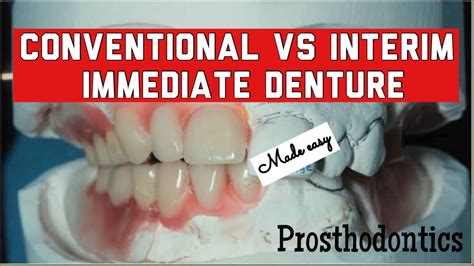Denture Timeframes: Immediate vs. Conventional Dentures
Losing your natural teeth can be a significant life change, but advancements in dentistry offer various solutions to restore your smile and confidence. One of the most common options is dentures, which come in two primary types: immediate and conventional. Understanding the key differences, particularly regarding their respective timeframes, is crucial for making an informed decision. This article will delve into the timelines involved in each process, outlining the advantages and disadvantages of each approach.
What are Immediate Dentures?
Immediate dentures are placed immediately after your natural teeth are extracted. This offers the benefit of not having a gap in your smile, allowing you to maintain your appearance and confidence throughout the healing process. However, because the gums are still healing and shrinking, immediate dentures often require adjustments over time.
Immediate Denture Timeframe:
- Day of Extraction: Dentures are fitted and placed.
- First Few Weeks: Expect some discomfort and swelling. Frequent adjustments are common as your gums heal and reshape.
- 3-6 Months: Relining or remaking is often necessary to accommodate gum shrinkage. This involves adding material to the denture base to ensure a proper fit.
- Long-Term: Immediate dentures generally last 5-7 years, after which they usually need replacement due to wear and tear and continued gum shrinkage.
What are Conventional Dentures?
Conventional dentures are made after your gums have fully healed from the tooth extraction. This allows for a more precise fit and typically leads to greater comfort and stability. The healing period provides time for the gums to shrink to their final shape, minimizing the need for frequent adjustments.
Conventional Denture Timeframe:
- Extraction: Teeth are removed, and healing begins (this can take several weeks or months, depending on the complexity of the extraction and individual healing).
- Impressions & Fittings: Several appointments are required to take impressions of your gums and fit the dentures precisely.
- Denture Delivery: Once the dentures are complete, they are fitted and adjustments are made as needed.
- Long-Term: Conventional dentures usually last 5-7 years, requiring relining or remaking over time.
Which Type of Denture is Right for Me?
The choice between immediate and conventional dentures depends on individual factors and circumstances. Your dentist will assess your oral health, bone structure, and overall health to determine the most appropriate option.
Advantages of Immediate Dentures:
- No Gap in Smile: Maintains appearance immediately after extraction.
- Faster initial restoration of function: Allows for immediate chewing and speaking.
Disadvantages of Immediate Dentures:
- More Frequent Adjustments: Requires multiple adjustments due to gum shrinkage.
- May be Less Comfortable Initially: Can cause more initial discomfort and irritation.
- Shorter Lifespan: May require replacement sooner than conventional dentures.
Advantages of Conventional Dentures:
- Better Fit: More accurate fit because gums have fully healed.
- Greater Comfort: Generally more comfortable and stable.
- Potentially Longer Lifespan: May last longer with fewer adjustments.
Disadvantages of Conventional Dentures:
- Longer Waiting Period: Involves a longer waiting time before dentures can be placed.
- Gap in Smile: There's a period without teeth while waiting for healing.
How Long Does the Entire Denture Process Take?
The total time for the entire denture process varies greatly depending on the type of denture and individual circumstances.
- Immediate Dentures: The initial placement is immediate, but the entire process, including adjustments and potential relining, can take several months.
- Conventional Dentures: The entire process, from extraction to final fitting, can take anywhere from 3-6 months or even longer, depending on healing time.
What About Aftercare and Maintenance?
Regardless of the type of denture chosen, proper aftercare and maintenance are essential to ensure their longevity and comfort. This includes regular cleanings, proper storage, and regular check-ups with your dentist.
Do Dentures Require Relining or Remaking?
Yes, both immediate and conventional dentures will likely require relining or remaking over time, typically every 5-7 years, as your gums continue to change shape.
Can I Get Dentures if I Have Gum Disease?
Treating any existing gum disease is crucial before denture placement. Your dentist will advise on necessary treatment before proceeding.
This comprehensive guide provides a clear understanding of the timeframes involved in receiving immediate and conventional dentures. Remember, consulting your dentist is crucial for personalized advice tailored to your specific needs and oral health. They can assess your individual situation and guide you towards the best solution for a comfortable and confident smile.

